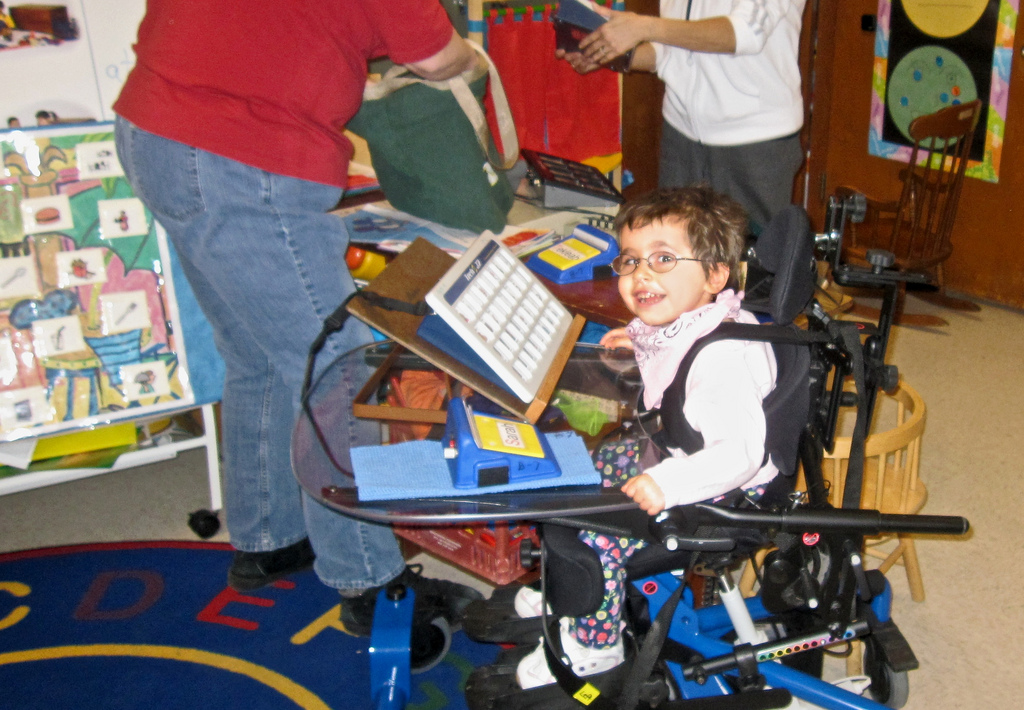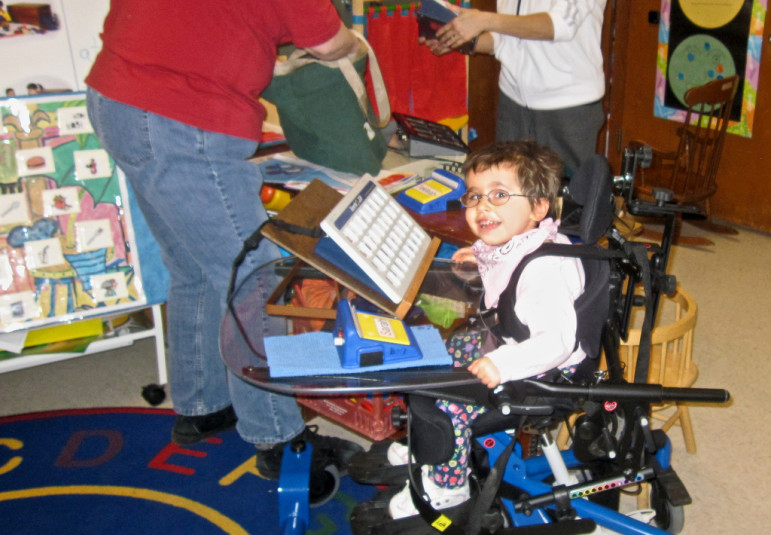By Christine Stoddard
For MarylandReporter.com
Despite limited mental capacity, a feeding tube, a wheelchair and the inability to speak, a child with cerebral palsy must take the same standardized tests in Maryland as his classmates.
But the Maryland State Education Association wants to give students with disabilities the chance to opt out of grade-level testing, depending on their needs, parents’ wishes and any testing accommodations allowed.
“Some of these students function as infants, not school-age students,” said veteran special educator Betsy Perry of Montgomery County during her testimony to Maryland’s new Testing Commission in Annapolis Monday.
Perry added that it may be unreasonable for certain students with Individualized Education Programs (IEP) to achieve grade-level results even with special accommodations.
An Individualized Education Program is a document required by the federal Individuals with Disabilities Education Act that outlines how children with disabilities will be supported in their education.
A 2013 report for the Maryland state Board of Education identified 103,788 special education students ages 3-21. Classifications included intellectual disability, hearing impairment, deafness, speech and language disability, visual impairment, emotional disability and orthopedic impairment.
MSEA strongly supported creation of the testing commission signed into law by Gov. Hogan. The 19-member commission includes several teachers, parents, school board members and school superintendents, but Monday was the teacher’s union first chance to actually testify.
Among six recommendations, MSEA asked that exceptions to standardized testing be made for special education students when typical accommodations are not permitted.
According to Perry, one of four teachers MSEA invited to testify, the question when determining accommodations is, “How much support do you need to provide to even the playing field?”
Wide range of disabilities to be accommodated
She told the commission that special educators serve students across the spectrum, whether they struggle with speech impediments or suffer from medically fragile conditions. Some are equipped for grade-level exams with just one or two adjustments, but that is not the case for all students with disabilities.
“For a child who is extremely medically fragile, school is there to improve their quality of life,” she said in an interview. “It should be comfortable, it should be entertaining. A child in that situation needs to learn how to master basic life skills, like sitting at a table, before they memorize the names of particular historical scientists.”
Maryland public schools allow various forms of IEP accommodations in the classroom. These include a human reader or audio recording of the test questions; a human reader or text-to-speech for recording answers; or a personalized math reference sheet. Yet PARCC, an English and math assessment required for students in 3rd-8th grades and high school since 2014, does not allow for these and several other accommodations. PARCC stands for Partnership for Assessment of Readiness for College and Careers and was an outgrowth of the Common Core curriculum.
IEP students must take the test anyway and schools are held accountable for their scores.
According to Bill Reinhard of the state education department, under federal law, all but 1% of the most medically fragile students must be assessed in state tests.
Special educators ‘frustrated, helpless’
In response to an open-ended MSEA survey, special educators voiced concerns about this requirement. Many feel “frustrated” and “helpless” when it comes to preparing certain IEP students for the PARCC test, the commission was told.
According to the PARCC Accessibility Features and Accommodations Manual, IEP students may not be assessed off-grade level or take a version of the test that has been modified to make it easier. The manual states that “accommodations that provide access to students on assessments should be based on their needs as students with disabilities or English learners[,] not their lack of content knowledge or skills.”
Perry believes that a student on a severe end of the disability spectrum should not necessarily be expected to know the same information as their peers. These students are instructed at their functioning level, which may not match their grade level.
“There needs to be a test that assesses [personal] growth. I don’t know if [certain students] will ever reach the bar, but I want to set high expectations,” said Perry, who added that it is not fair to compare IEP student results to the results of their peers.
Special education teachers pulled to proctor tests
Perry added that special educators are also pulled to proctor tests for children without IEPs.
“Students, parents, and teachers depend on these services,” she said. “I believe that [these students] need every moment of service. Anytime they’re taken away from their learning is time that they do not get back.”
MSEA presenters — vice president Cheryl Bost, assistant executive director Sean Johnson and press secretary Steven Hershkowitz — also recommended the following:
- create state and local teams to collect and report testing data;
- put a cap on the time districts spend on testing every school year;
- mandate monthly reporting about district tests to parents;
- change the Kindergarten Readiness Assessment to a sampling test;
- replace the high school-level PARCC with SAT, ACT or Accuplacer;
- shift to performance-based assessments.
MSEA defined a “good” test as one that aligns with the curriculum, informs teachers’ instruction, provides timely feedback and effectively measures critical thinking, complex skills and subject mastery.
“When it comes to standardized testing for, we need far more flexibility and thoughtfulness,” said Perry.
Find out more
For more information about the Maryland State Education Association, visit www.marylandeducators.org.
To learn more about PARCC, go to www.parcconline.org/about/states/maryland.
For IEP fact sheets and evaluations, go to http://www.marylandpublicschools.org/msde/divisions/earlyinterv/Special_Ed_Info.htm.
Christine Stoddard can be reached at [email protected]





Recent Comments